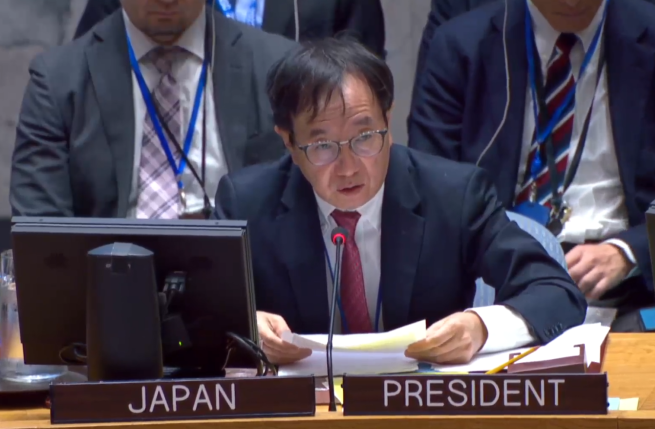アフガニスタン情勢に関する安保理ブリーフィングにおける山﨑大使ステートメント
令和6年3月6日

(As delivered)
I would like to begin by thanking Special Representative Otunbayeva for her briefing on the situation in Afghanistan and UNAMA’s activities, and I am also grateful for the insightful briefing by Ms. Fatima Gailani, which gave us a broad perspective.
The situation in Afghanistan is becoming more complex, and our interpretation varies depending on from what angle we see the country. The economy is somewhat stable but at a very low equilibrium and its base remains fragile. Security has broadly improved but the threat of terrorism persists. Although opium cultivation decreased significantly, the production of methamphetamine is increasing. While we acknowledge that the Taliban has claimed achievements, there is little progress on the human rights situation including with regards to women and girls, which is one of the issues the international community, including Japan, is most concerned with. Additionally, the humanitarian situation remains dire, compounded by earthquakes, a mass influx of Afghan returnees from Pakistan and the country’s susceptibility to climate change.
What I think we can agree on is that the current situation is at an impasse and not sustainable. There are numerous problems which require an internationally coordinated approach to tackle. We should work to alleviate the suffering of the Afghan people and not let Afghanistan be destabilized again.
In this vein, we welcome that the participants of the Special Envoys’ meeting in Doha last month agreed on the importance of continued engagement with the Taliban and the need to address the issues contained in the independent assessment. I commend Secretary-General António Guterres’s initiative to make this event productive and thank the Government of Qatar for hosting the delegations. Japan actively contributed to the discussions, stressing the importance of patient, pragmatic and principled engagement with the Taliban through confidence building measures.
We believe the meeting in Doha would have been an ideal opportunity for the Taliban and international actors to communicate their positions directly, build confidence and deepen engagement. Also, participating countries would have been able to explain to the Taliban the need to address human rights and other issues.
We support Secretary-General’s intention to make this meeting format of Special Envoys a standing one, where stakeholders can meet more frequently and at various levels. We hope that the Taliban will participate in the next meeting. In this regard, it is critical that the UN continues and strengthens its communication with them. Needless to say, various actors, including women, must participate in processes concerning Afghanistan.
We also hope to see a UN Special Envoy on Afghanistan appointed sooner rather than later, in accordance with Resolution 2721. The Special Envoy needs to be able to facilitate engagement, build a cooperative relationship with the Taliban, actively communicate with neighboring and donor countries, and work closely with the SRSG. This will be a vital part of a framework to address Afghanistan’s issues in a more coherent, coordinated, and structured manner.
Japan will continue to be proactive in assisting and empowering the Afghan people, and remains committed to supporting the active engagement of the United Nations to the greatest extent possible, including through our Embassy in Kabul. Our Embassy in Kabul will keep explaining to the Taliban the significance of greater engagement with the international community, while urging them to reverse their repressive policies on women and girls.
As the Secretary-General mentioned in his latest report, the UN’s presence remains critical for Afghanistan to address a myriad of challenges. UNAMA is more important than ever, and Japan fully supports its role and functions under the leadership of Special Representative Otunbayeva. We are doing our best to realize a smooth renewal of its mandate next week.
I thank you.
